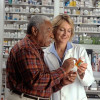
Generally, Adderall causes weight loss. Here, we review weight loss side effects when taking amphetamines, as well as dosing effects and potential for abuse and addiction. We invite your questions about Adderall side effects at the end.

Generally, Adderall causes weight loss. Here, we review weight loss side effects when taking amphetamines, as well as dosing effects and potential for abuse and addiction. We invite your questions about Adderall side effects at the end.

Although pharmacy techs are sometimes seen merely as the customer service providers of a retail pharmacy, their jobs are actually much more complicated and pivotal to the healthcare industry – and with the PTCB (Pharmacy Technician Certification Board) having announced an update to its Certification Exam on June 6, 2012, we thought it might be a good time to examine the role that pharmacy technicians play in the healthcare industry. The pharmacy technician’s main role is to assist a licensed pharmacist. However, this involves much more than waiting on the customers who come in to pick up prescriptions. The first » » » [Read more]
Thyrotoxicosis or hyperthyroidism is relatively rare in children. According to reports, the yearly incidence is 8 per 1 million children who are younger than 15 years old and 1 per 1 million in children younger than 4 years old. Among these patients, Graves’ Disease is the most common cause. It is noted that girls are affected five times more than boys. A family history of hyperthyroidism should be sought because many have a positive family history of autoimmune thyroid diseases. A clinical profile includes several month records of progressive symptoms, of which, the most common are often behavioral disturbances such » » » [Read more]

Like the commonly known ailments, there are several treatments for repetitive stress injury. Below are some options that you can choose from to treat your strained muscle. 1. Rest Stop whatever you are doing that caused your condition. Of course it is impossible to stop working, so the best thing to do is take some break from your tasks. Relax for a bit. If you can’t do it while at work, then visit a massage therapist once in a while. Massage has long been known as a therapeutic technique that manipulates the soft tissues of the body. It provides calming » » » [Read more]

A good chunk of every medical visit is spent writing prescriptions. Before we had an electronic medical record, this was often an arduous task, leading to serious writer’s cramp. Now the computer makes it easier on the doctor, but it doesn’t seem to have much effect on the patient. An article in the Journal of General Internal Medicine highlighted what most doctors have suspected all along, that a good chunk for these beautifully printed, fully legible prescriptions never make it to the drug store to be converted into actual pills. The study utilized an electronic system to trace nearly 200,000 » » » [Read more]